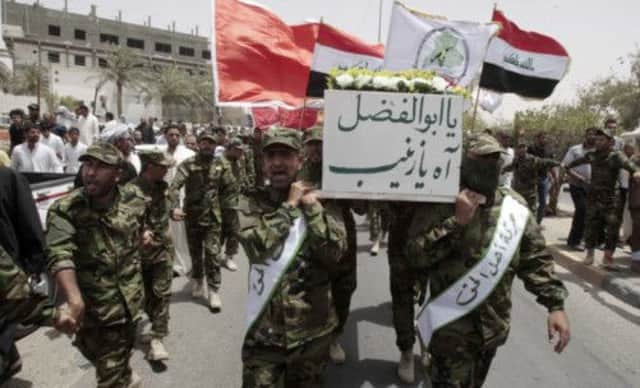Syria: Rebels under siege in plea for help


Though Moscow contradicted suggestions he had taken delivery of an entire, long-range S-300 anti-aircraft system which alarms Israel, Russia’s plan to send them highlighted the international confrontation brewing over Syria, even as Moscow and Washington work together for a peace conference between the warring sides.
With Iran and its Lebanese partner Hezbollah also rallying to Assad’s defence and his western-backed Syrian opponents bogged down in squabbles, the president was quoted yesterday as sounding confident of his position at home and abroad. He would attend peace talks in Geneva, he said, but he expected to keep fighting the revolt.
Advertisement
Hide AdAdvertisement
Hide Ad“Syria has received the first shipment of Russian anti-aircraft S-300 rockets,” Hezbollah’s Al-Manar TV quoted Assad as saying. The Syrian leader added: “All our agreements with Russia will be implemented and parts of them have already been implemented.”
Among Assad’s enemies on the battlefield, rebels in besieged Qusair warned that the border town could be wiped off the map and hundreds of their wounded might die if no help came soon.
“The town is surrounded and there’s no way to bring in medical aid,” Malek Ammar, an opposition activist in the town, said yesterday over an internet link, adding that about 100 of the 700 wounded require bottled oxygen to keep breathing.
“What we need them to do,” he said of other rebel units, “is come to the outskirts of the city and attack the checkpoints so we can get routes in and out of the city.”
There was little immediate sign, however, of military relief or of a negotiated settlement that might end the fighting.
Harsh words from Moscow against the Syrian opposition’s insistence on Assad’s removal as a precondition for talks, and Russian criticism of Washington for considering a no-fly zone to help the rebels, underlined the geopolitical stakes in the war.
And an exchange of fire across the Turkish border on Thursday was a reminder that all Syria’s neighbours risk being sucked into a regional conflict.
Rebels at Qusair and others encircled near Damascus, who also appealed for reinforcements, face shortages of weapons. Fears of the Islamists in the rebel ranks have deterred western powers from supplying them, despite wanting to see Assad fall.
Advertisement
Hide AdAdvertisement
Hide AdThe result, after two years of fighting and more than 80,000 deaths, has been an increasingly sectarian stalemate in which Assad has lost control of swathes of territory but remains in power.
Taking back Qusair would help secure access from Damascus to the coastline populated by his minority fellow Alawites.
For the rebels, mostly drawn from the Sunni Muslim majority, Qusair secures supply lines from sympathisers in Lebanon and from further afield, notably Sunni-ruled states in the Gulf.
The rebel commanders at Qusair warned of dire consequences if help fails to arrive for men who have been fighting house to house for over a week against a force armed with tanks and rocket-launchers and spearheaded by Lebanese fighters from Hezbollah, seasoned in a 2006 war against Israel.
“If all rebel fronts do not move to stop this crime being led by Hezbollah and Assad’s traitorous army of dogs,” said the statement, “we will soon be saying that there was once a city called Qusair.”
Shells were landing by the minute and the attackers seemed to be advancing more quickly after seizing a nearby air base.
Elsewhere, rebels blockaded in eastern suburbs of Damascus said Assad’s forces were “preparing to commit more massacres”.
SEE ALSO: